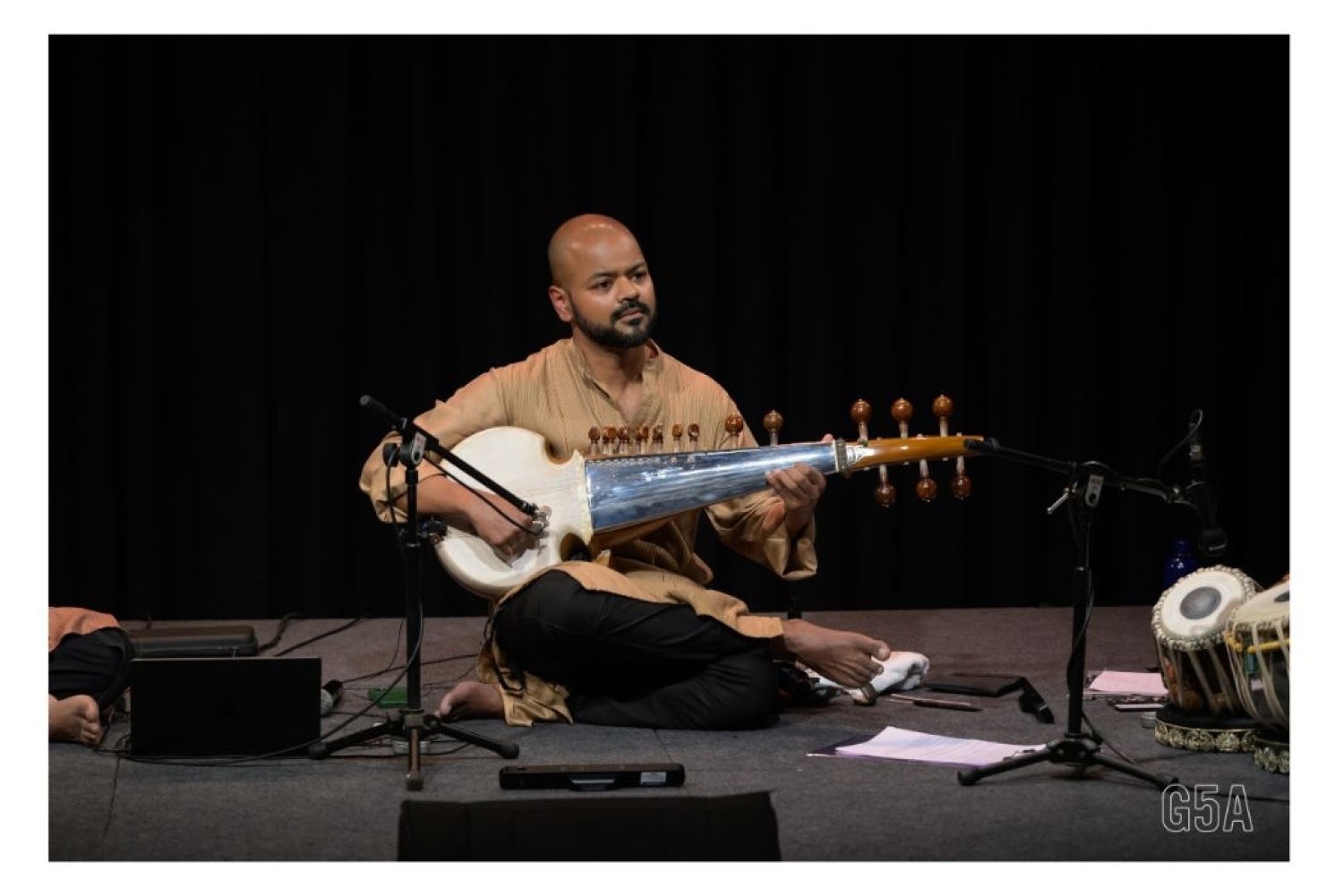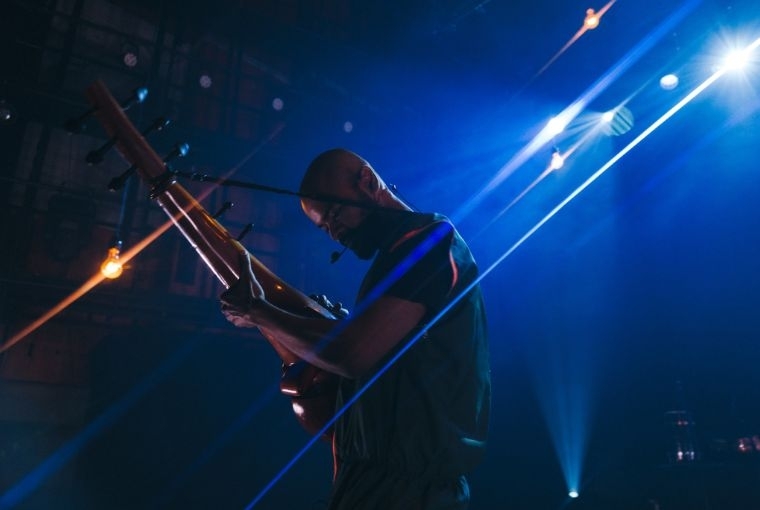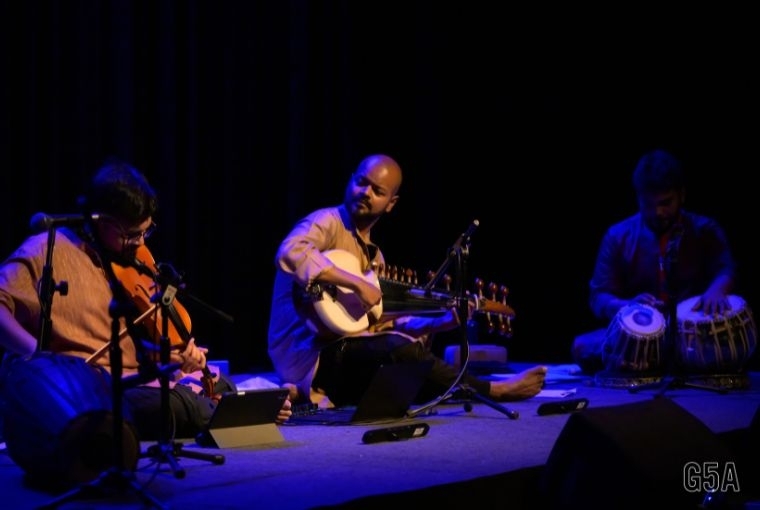

Award-winning sarod maestro and composer Soumik Datta returns to India for his most ambitious tour yet – Melodies in Slow Motion. This expansive journey will carry him from concert halls and festivals to homes, villages, and schools, where he will collaborate with young musicians, record in unexpected spaces, and share new music along the way.
'This isn’t just a tour; it’s a deeply personal journey rooted in the memories of growing up in India, and a desire to share music where it’s needed most,' says Datta of the journey that will take him to all the four corners of the country. 'We’ll be playing at festivals, halls, homes, schools, hospitals, and youth justice services, and building community relationships. I want to diversify where music can be taken,' he adds.
The tour opens with his new single Freedom, recorded during the recent premiere of his show Travellers at Mumbai’s G5A Warehouse earlier this summer. Captured as a raw, unedited mix straight from the sound desk, Freedom embodies a burst of spontaneous energy – a moment of truth between the artists, their audience, and the shared space they created together.
Drawing from both the street and folk traditions of India and the drum and bass soundscapes that shaped his London upbringing, Freedom bursts forth as a raucous collision of sound and colour. The track reimagines the classical jugalbandi by turning to counterpoint within Indian music. Datta’s sarod weaves through the evocative strains of Raga Tilang, while violinist Sayee Rakshith responds in Raga Brindavani Sarang. At times they move in harmony, at others they revel in beautiful dissonance—until both ragas converge on a shared melodic hook, finding unity in contrast.

What was it like to be a boy in London playing the sarod?
When I was growing up, there was a lot of scepticism about what I was doing because the sarod was not one of the very well known instruments. And when I was young, every time I left India, I felt like I was leaving something behind. I was leaving behind not just my mentor, but a level of acceptance for the instrument. The acceptance of other cultures within a metropolis like London was still debatable those days but I have tried hard to not be deterred by that. I have seen how people’s opinions have now changed and how they have become more accepting of the sarod, of other cultures and music that is not mainstream.
What inspired your new single, Freedom?
This musical approach, highlighting differences while seeking out common spaces, is a metaphor for our world today. In a time of increasing fracture, ‘Freedom’ is a reminder that our personal humanity is part of a larger, shared cause. It's a stand against genocide and the oppression of vulnerable people, a testament that our notes can be the notes of others, that cultures and languages can find common ground.
You’ve been shuttling between Britain and India. Do you still feel at home here and have you ever thought of coming back and creating?
I really want to bring The King of Ghosts here because I feel it will resonate with people here but we’re still waiting for funds. Another project that has been bringing me to India is a six part documentary film series which was my first directorial debut, and it involved travelling to rural areas. It was my journey travelling to six states of India in search of underrecognised, incredibly talented folk and tribal musicians. It is called Tuning 2 you, Lost Musicians of India. We went to villages in Karnataka, in Goa, in Nagaland, Rajasthan, West Bengal, UP. It was a massive project and took about a year and a half to make. The film series released on one of the UK’s national television channel and it is coming to India this year.
How would you describe your sensibility?
Through my music I like to bring together people from different cultures to have meaningful collaborations and dialogue. We need to break down borders; we need to translate and engage with other cultures and empathise with people who are different from us. And music is a language through which we can do that as it overcomes the restrictions of language.

Datta will also be taking ‘Travellers’ across the country over the next few weeks starting with Ziro Festival of Music this weekend, and shows in Mumbai, Bangalore, Jaipur and Delhi through October and November.
Travellers is a sonic journey that layers field recordings and immersive sound design with a virtuosic band to transport audiences across the invisible borders that divide land, places and people. Woven through the music, we hear the cries of refugees being deported and the plea of news reporters in Gaza. The sound of missiles echo across the speakers counterbalanced by the sound of sarod, violin and percussion.
Inspired by personal and collective experiences at airports and borders, Travellers offers audiences a powerful, timely reflection on our interconnected lives, across generations, time zones and continents.
Dates for Travellers
October 10 – NMACC, Mumbai | Tickets
October 30 – BIC, Bengaluru
October 31 – Sabha, Bengaluru | Tickets
November 7 – Rajasthan International Centre, Jaipur
November 13 – Delhi
Words Platform Desk
2.10.2025